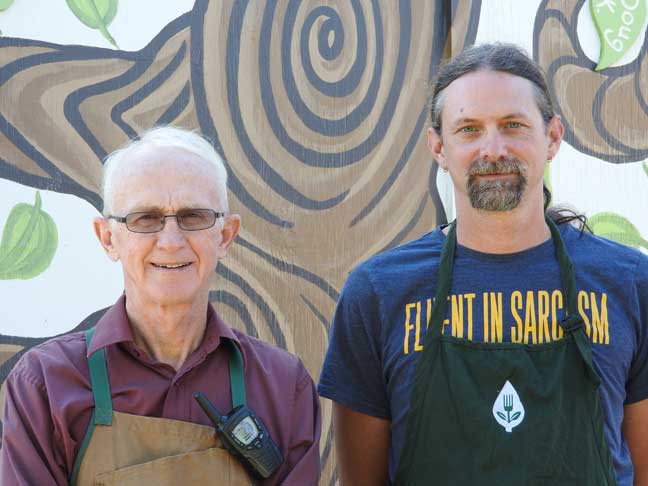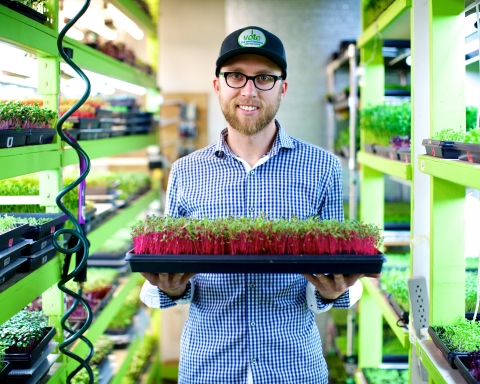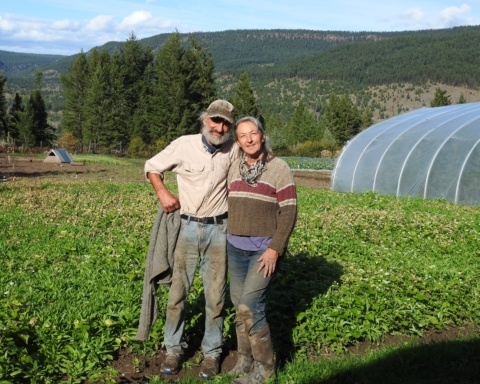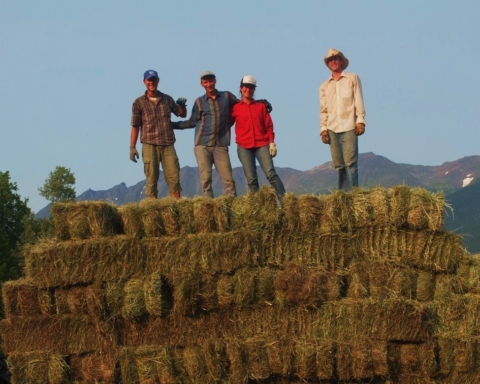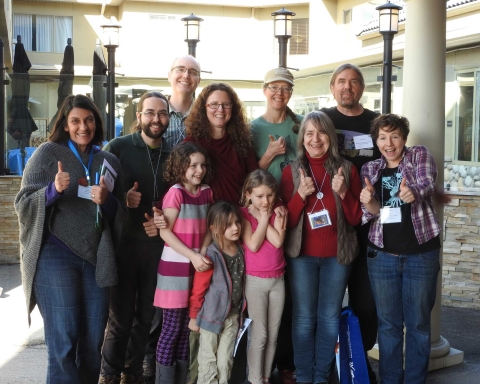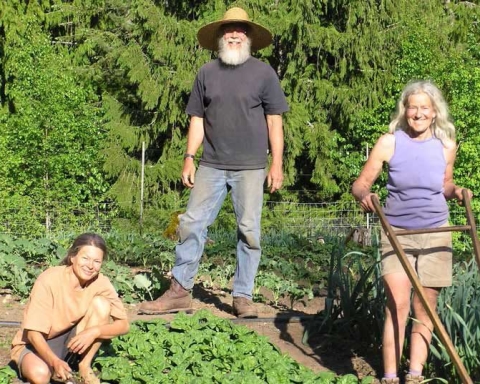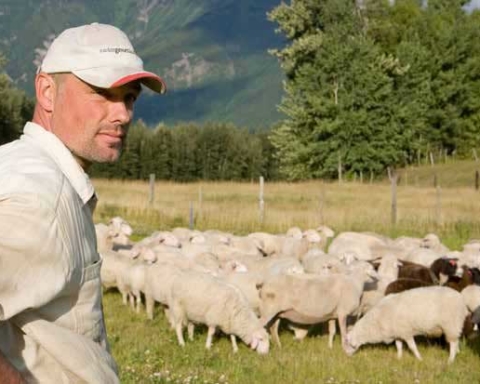Marjorie Harris
Finding the Roots of Recovery on an Urban Farm
Gardengate is a completely unique gem in the world of organic farming and in the broader social community as well. Despite the North Kamloops-based program’s role as a client-centered community service first, and organic farm second, Gardengate’s organic farm boasts an annual harvest of 20,000 lbs of certified organic fruits, berries, herbs, flowers, transplants, and vegetables grown on 2.8 acres of land!
Gardengate Farm is a project operated by The Open Door Group, a British Columbia non-profit whose mission is to help open doors and inspire all individuals to succeed in a vision of the future where each person’s success and contribution helps to create thriving communities.
The farm infrastructure includes a 2,400 square foot greenhouse, a state-of-the art root cellar, a brand new roofed vegetable washing station, a soil sterilizer for making potting mix, a compost site, several well maintained tool and storage sheds, and an on-site store front. Farm Operation Manager Robert Wright says that “when people first arrive at Gardengate, they are surprised at the scale of the operation within city limits and the sense of calm that pervades the gardening hub of activity.”
To support Gardengate’s mission to build healthy communities, the harvest is distributed amongst the participants, community volunteers, donated to various programs around Kamloops, and sold from the on-site farm gate store. An innovative delivery service called Produce On Wheels delivers a selected bag of produce every other week to individuals in need. The delivery also includes information on how to identify the items, how to store them, and most important of all how to turn the food into delicious, healthy meals.
Public participation is encouraged through volunteering and annual on-farm festivals such as the Salsa Challenge held every August – a friendly food competition with community partners that is also open to the public. In October, the annual free Pumpkins of Light event turns the farm into a light show with over 300 pumpkins displayed at night for the public. Local school children visit to select their personal pumpkin from the pumpkin patch for a Jack-O-Lantern.
Open Door Group operates on the fundamental belief that all individuals have the ability to succeed and they therefore build strong partnerships within BC communities for client resilience. Because The Open Door Group centres on empowering individuals, their vision is realized by helping people find employment and community attachment. To meet these goals through growing food, the Open Door Group established the Gardengate organic operation on land leased from the Interior Health Authority and located on the South Hills Tertiary Psychiatric Rehabilitation property in North Kamloops, BC.
Gardengate operates with two principles in mind: first, to build community by growing food and futures through diverse and supportive programs for persons with disabilities while contributing to the health and wellness of the community; second, to encourage individual development by promoting self-confidence, self-sufficiency, community connectedness and wellness. Under this umbrella fall promoting healthy eating, safe food handling, and food security, as well as providing access to nutritious organic vegetables and expanding the horticulture skills of all participants and community volunteers.
Gardengate is able to provide year-round employment and leisure programs for individuals living with mental health challenges. Robert describes with enthusiasm how this program has expanded over the past 10 years, developing tremendous successes in terms of programming and individual accomplishments, as well as increasing food security within Kamloops.
Robert emphasizes that the farm’s work with people is always first and foremost; the need to produce is secondary. While this is distinctly different from the typical farming business model, they still incorporate a number of farming components into the activities participants have access to, while raising funds for the program. For example, as Robert explains, “our greenhouse is instrumental to our ability to grow what we want and have it ready for planting when we need it. It is also a vital part of our enterprise as plants are grown for sale to the public and several other organic farms. It provides valuable experiences and funds to Gardengate, while supporting the needs of other organic farms.”
Gardengate also grows for other non-profits that require plants and have little or no budget to purchase. An employee is hired for the busy two month period in April and May, and field planting in the 1.5 acre market garden begins as soon as they can work the ground. The early harvest goes to on-site use or donations primarily until public sales begin in mid-July.
So, with all these social programs happening on the ground, how does Gardengate farm? Considering they operate on a smaller scale and are urban, there’s a lot of collaborating with the city and neighbours to ensure they can stick with the organic regulations. Having assurances that there is no spraying and communicating to increase others’ understanding of organic farming is key.
In the fields, Gardengate uses several key factors to increase successes and minimize challenges by being proactive. Composting field waste is key in controlling weeds and stale bed tilling. Compost is rotationally applied through newer transitioned areas of land to help augment the soil there. On top of this they use a combination of cover crops, drip irrigation, regular field mowing, and mulches to help control weeds.
At Gardengate, the farmers and community participants pride themselves on working with nature – “as any farmer should,” Robert says. They promote beneficial plants and insects to encourage pollination and weed out pest insects. What they can’t produce on-farm, they source organically. Organic approved sprays and other applications are always a last resort, or used sparingly as maintenance.
“I think the biggest thing for anybody coming to work with us is developing the relationship with the garden and the life giving plants within it,” Robert says. “People have an opportunity to work with something that is alive and yet completely unconditional. Plants are resilient and respond in positive ways even if they have some road bumps handed out to them in their journey.
“A person working here is also able to experience the cycle of life from seed, or inception, to the harvest and ultimately pulling that plant out at the end of the year – a full experience of Mother Nature’s seasonal rhythm before the blanket of snow puts soil to rest.”
At Gardengate, the participants all enjoy the fruits of their labor each day they work. They see the joy and experience the benefit their work provides to those in need. And on top of all of that each day is a learning experience where there is no need to think they are any different, and are a part of something meaningful.
What farmer could ask for more?
Learn more about Gardengate here! You can also check them out on Facebook at Open Door Group’s Gardengate Horticulture Program, or call them up at 250-554-9453.
Marjorie Harris, BSc, IOIA V.O., P. Ag. Email: marjorieharris@telus.net
“Let food be thy medicine and medicine be thy food.” – attributed to Hippocrates


